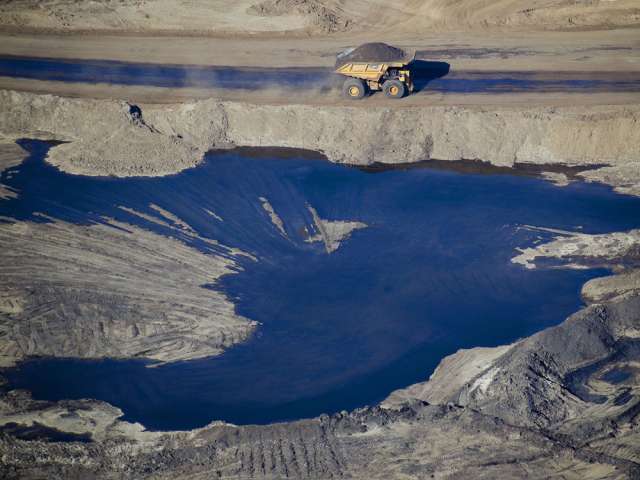
CALGARY – All of Canada’s largest oil companies are underwater at current oil prices, oilfield service providers are laying off staff as they struggle to pay their debts and a new report argues the industry “has never faced a greater threat to its existence than it does right now.”
With the price of Western Canada Select heavy oil trading at US$8.90 per barrel on Tuesday, oil producers such as Suncor Energy Inc. and oilfield services companies including Precision Drilling Corp. have started making additional deep spending cuts. Precision also signalled new layoffs are coming as the industry tries to survive both a drop in global oil demand induced by the coronavirus pandemic and an oil price war.
The dual threat of anaemic oil demand and surging oil supply from Saudi Arabia and Russia presents a challenge to the Canadian industry that is greater than either the oil price crash of 2014 or the National Energy Program of the 1980s, said University of Calgary School of Public Policy fellow Richard Masson in an interview with the Financial Post.
During each of those two shocks, Masson said, Canadian companies were able to move rigs and investment dollars to the U.S.
But with some investment banks projecting that up to 40 per cent of U.S. oil producers could fail in the next two years, “it seems companies don’t have a lot of good options,” Masson said.
The Canadian oilfield services sector is particularly vulnerable.
On Tuesday, Masson and economist Jennifer Winter released a new report that noted Canada’s 20 largest oilfield service companies have roughly $8 billion in debt, which makes up about 60 per cent of their current enterprise value. The report suggested that a $2-billion preferred share offering from the government to the group could “substantially improve balance sheet ratios and provide cash to help prevent insolvency.”
“As people continue to cut budgets, there’s no choice but to cut staff and mothball rigs and all that makes your debt covenants loom larger,” Masson said. “There’s no way to raise new money. There’s no place to get new business. It’s very, very frightening.”
The report echoes Business Council of Alberta’s plea last week to Prime Minister Justin Trudeau to create a “federal Troubled Asset Relief Program (TARP) modelled after the U.S. program developed in 2008 to purchase positions in distressed companies.”
Meanwhile, a letter from the Canadian Association of Physicians for the Environment, Climate Action Network Canada, Greenpeace and others asked the federal government to focus any bailout of the oil industry on workers and families, not corporations.
The request came in an open letter to Prime Minister Justin Trudeau, released Tuesday morning and signed by environmental organizations, faith and labour groups that the signatories say represent about 1.3 million people.
“Giving billions of dollars to failing oil and gas companies will not help workers and only prolongs our reliance on fossil fuels,” the letter said.
Giving billions of dollars to failing oil and gas companies will not help workers and only prolongs our reliance on fossil fuels
open letter
Precision Drilling Corp. announced Tuesday it would reduce its headcount, cut its spending by 50 per cent this year to $48 million, slash CEO Kevin Neveu’s salary by 20 per cent and implement other salary reductions.
The company did not indicate how many staff would lose their jobs but said in a release it would result in a $30-million reduction in the company’s general and administrative expenses for the year.
The company’s moves to reduce its debt in recent years “leaves Precision well positioned to navigate this challenging environment,” Neveu said in a company statement.
However, the company faces US$91 million in near-term debt maturities and at current Canadian dollar exchange rates, will need to pay $132 million to fully eliminate that debt before the end of the year, Raymond James analyst Andrew Bradford wrote in a research note Tuesday.
Bradford said he expects the company “should be able to retire the debt and preserve sufficient liquidity to weather the storm into 2021.”
However, oilfield service companies face enormous challenges through the remainder of the year as companies including Chevron Corp. in the U.S. and Suncor in Canada announced aggressive spending cuts.
Suncor, like all of the other major Canadian oil producers, is currently looking at an oil price well below its breakeven cost per barrel.
West Texas Intermediate oil prices climbed 2.8 per cent on Tuesday to settle at US$24.01 per barrel.
At those prices, analysts from Peters & Co. said in a Tuesday note, only Canadian Natural Resources Ltd.’s Horizon and Athabasca oilsands projects would generate enough cash to cover sustaining capital.
The Calgary-based investment broker’s analysis showed that Canadian Natural, which needs the lowest oil price of Canadian and U.S. large oil producers, would need US$26 per barrel to generate positive free cash flow from its operations. In order to fund its dividend and cover its maintenance capital, the company would need US$42 per barrel WTI prices.
Canadian Natural cut its budget and rolled back salaries last week in response to lower oil prices.
Late Monday, Suncor followed suit and announced it would cut its capital budget for 2020 by 26 per cent, or $1.5 billion, to between $3.9 billion and $4.5 billion and also reduce its oil output for the year by 60,000 barrels per day to between 740,000 bpd and 802,000 bpd.

“The simultaneous supply and demand shocks are having a significant impact on the global oil industry,” Suncor president and CEO Mark Little said in a release. “We are adjusting our spending and operational plans to be prepared in the event the current business environment persists for an extended period of time.”
As a result of social distancing measures and a drop in demand for plane travel, Suncor is also making adjustments at its refineries in Edmonton, Montreal, Sarnia, Ont., and Commerce City, Col., because it expects less demand for gasoline and jet fuel this year.
“Product demand is starting to decline and is expected to continue over the next few quarters. Suncor has begun to adjust refinery utilizations as a result,” the company said in a release.
Suncor’s first round of cuts to its budgets are sufficient for the time being, Edward Jones analyst Jennifer Rowland said in an interview. “I think the reaction that we’re getting and the capex cuts that we’re seeing is enough for now,” she said.
However, steps to reduce spending will need to be re-evaluated over time — and could lead to further cuts — depending on the duration of the Saudi-Russia oil price war and further impacts on oil demand from increasingly widespread stay-at-home orders, Rowland said.
On Tuesday, India ordered a country-wide lock down of its more than 1.3 billion people, creating a new strain on global oil demand as the South-Asian country is the third largest oil consuming country in the world after China and the U.S.
This follows moves by the United Kingdom on Monday, France over the weekend and Spain last week.
As fewer people drive in the U.S. and more commuters work from home to prevent the spread of coronavirus, analysts fear a further fall in oil demand in the form of lower gasoline consumption.
Financial Post
• Email: [email protected] | Twitter: geoffreymorgan
You can read more of the news on source
